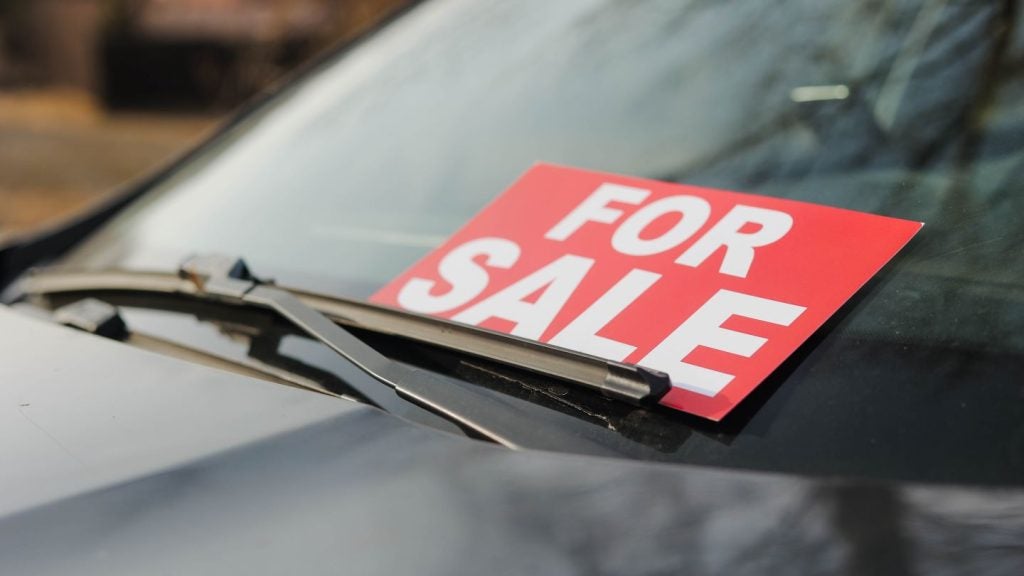
As the Financial Conduct Authority (FCA) demands better value for consumers from GAP Insurance, the automotive industry faces a critical juncture. The FCA’s findings that a mere 6% of premiums were paid out in claims have led to calls for reform, putting pressure on insurers and dealers to prove the worth of their products under the new Consumer Duty regulations.
Guaranteed Asset Protection Insurance, or GAP Insurance, is a type of coverage put in place for situations where a customer’s vehicle is written off or stolen, or cases where a motor insurance pay-out does not pay back the vehicle’s original value at purchase or its remaining finance value if the vehicle was bought that way. It is typically sold alongside car finance.

US Tariffs are shifting - will you react or anticipate?
Don’t let policy changes catch you off guard. Stay proactive with real-time data and expert analysis.
By GlobalData“Although GAP insurance isn’t a legal requirement or essential for car owners to have, its popularity stems from its ability to reduce vulnerability and promote peace of mind in the event of a total loss situation,” says Daniel Briggs, CEO at Motorfinity.
However, the protection this coverage provides came under scrutiny last year, when in September the Financial Conduct Authority (FCA) claimed that only 6% of the amount paid in premiums by customers would eventually be paid out in claims.
“We acted because we were concerned that just 6% of consumer’s premiums were being paid out in claims and people were not getting fair value. We were also concerned about high commission levels: we saw instances of seventy pence in every pound in premium paid,” an FCA spokesperson tells us.
FCA: General insurance value measures data 2022
The FCA told the industry that it needed to take immediate action to prove that customers were getting a fair deal, and gave a three-month ultimatum to make that case.
“Historically, GAP insurance has been viewed as a consistent point of profit for dealerships across the UK, and the FCA’s recent review of this insurance aims to improve consumer duty and reduce systemic bad practice, allowing the industry to really get its house in order,” says Briggs.
There were also signs that the FCA was looking to make an example here, showing the firmer hand it would be taking under the auspices of the new Consumer Duty. The new Consumer Duty, introduced last year, states that companies must offer customers fair value, while ensuring that their products and services meet the customers’ requirements, and provide excellent customer service.
“This is an early signal of the work we’ll be doing under the Consumer Duty. Customers should be reassured that we’re in their corner and are taking action where we see poor value being provided. If the firms are unable to prove they’re providing fair value to their customers, they should expect further action from the regulator,” Matt Brewis, Director of Insurance at the FCA, said at the time.
Questioning the data
From the start, some questioned the claims and data that the FCA were drawing from. Particularly that an average GAP Insurance claim is £529, and that only 6% of premiums are paid out in claims, with some in the sector saying that their own data did not bear the claims out.
Looking at the data the FCA offered to support their claims, when broken down to the individual insurers all but one had average claim sizes far in excess of £529. The data also shows a claims acceptance rate of 99.3%, and a 0.63% rate of complaints from claims, which insurers argue demonstrates people know what they are buying and are receiving what they expect.
The argument is that these figures would put GAP Insurance as a stand-alone product among the best-performing products in those categories on the FCA analysis and comparison of products.
The FCA, meanwhile, posits that claims acceptance rate and customer complaint rates are just some of many measures of value, drawing attention back to claims frequency and ratios, in particular its oft-cited statistic that 0.34% of customers who bought GAP policies as an add-on claimed on the policy and 1.8% of customers who bought GAP standalone claimed on their policy.
The FCA also frequently draws attention to its statistic that in 2022 only 6% of the amount customers paid in premiums for GAP insurance was paid out in claims, with some firms paying as much as 70% of the value of insurance premiums in commission to parties involved in the sales process.
In February this year, the FCA stated that it was not satisfied with the industry’s response to its ultimatum, and announced that multiple insurance firms had agreed to pause sales of GAP insurance, following its own request. Together, these firms accounted for 80% of the total GAP market.
“I welcome the agreement by firms providing GAP insurance to pause sales while they work on improving value for customers. GAP insurance can provide a useful service to customers, but in its current form it does not offer fair value and we want to see improvements,” said Sheldon Mills, Executive Director of Consumers and Competition at the FCA. “We will continue to work closely with firms as we carry out further engagement to resolve these issues and ensure customers are getting fair value products that meet their needs.”
In its statement announcing the cessation of GAP insurance sales, the FCA identified concerns with the design of GAP insurance across all distribution channels but said it would consider firms’ proposals for different distribution channels.
Brokers, however, have claimed that they have been largely excluded from these discussions. At the recent British Insurance Brokers’ Association (BIBA) conference brokers were asking to be brought into these discussions. GAP insurance is not sold only by motor dealers, but also by online brokers who only take inbound enquiries.
Alternative coverage
The entire discussion has dealt a reputational blow to GAP insurance as a product, and at the same time, there are concerns that the industry could see hefty price increases from insurers that were not discussed before the intervention.
“The move has left UK dealers with a financial hole they have struggled to fill and car owners vulnerable to being left out of pocket in the event of an accident,” says Anthony Hogan, Automotive Business Development Manager at Road Angel, a manufacturer for dash cams and speed camera detectors. “Dealer margins on vehicle sales were already under pressure with the rise of the EV impacting repair and replacement revenues.”
It has led customers and dealerships alike to look for alternatives.
“Car dealerships have been considering new ways to offer UK drivers protection and peace of mind after new Gap insurance sales were put on hold in February this year following FCA concerns over fair value,” says Hogan, pointing to solutions such as dash cams that could offset some of the negative financial impacts of the suspension of GAP insurance sales while also generating insurance premium reductions and a faster claims process.
Motorfinity, meanwhile advocates shopping around for car insurance to find savings that can support car owners in situations where GAP insurance would have helped previously.
However, the case for GAP insurance remains to be made.
A multi-year product
One of the criticisms of the FCA’s analysis of GAP insurance is that GAP is a product that covers multiple years at a time and is linked to the depreciation of the vehicle. If a customer buys a four-year policy, the insured vehicle will depreciate more throughout the length of the policy. A car purchased for £25,000, might lose £5,000 in value in the first year, but go on to lose between £15,000 and £20,000 in value subsequently. Put another way, the argument goes, that the size of the claim gets bigger the longer the consumer keeps the policy.
The FCA’s data hails from 2022. If the FCA only looked at policies incepted in 2022 and only looked at claims on those same police, the data would only show GAP insurance data from the first year of cover, the year when the claim is at its smallest.
If this is the approach the FCA took, an alternative way to analyse the data would be to look at data from expired policies in 2022. GAP insurance either expires at the natural end of the agreed policy term, or when a policyholder makes a claim, and they can only make one claim. If the ‘expired’ data of all the general insurance products had been compared, the argument goes that this would have been much more even-handed and provided results more in line with the average claim data in the FCA’s data set.
However, the FCA has stated that its 2023 value measures data covers January to December 2022. This includes premiums written in that period and claims settled. The FCA has said that it took into account a range of factors such as business mix, age of the product, duration of policy, target market, and volume of business which could create significant variation across products or firms. Many factors contribute to the value of an insurance product, and the FCA argues that it has considered all these factors together.
Of course, any data set from the last few years will have another big factor at play. The post-Covid aftermath has seen vehicles priced at their highest levels in recent memory. In other words, it was a period of minimal depreciation. Meanwhile, insurers are already reporting significantly higher claims for 2024.
Back to market
However, GAP insurance is not completely over with. In May the FCA confirmed that several providers had been allowed to recommence sales of GAP insurance products. The selected firms were those that the FCA said had demonstrated their GAP products provided fair value to customers, in line with FCA rules. Those firms were the Fortegra Europe Insurance Company Ltd, Motors Insurance Company Ltd, Amtrust Europe Ltd and Financial & Legal Insurance Company Limited.
“Firms that have resumed sales of GAP insurance have done so with materially lower levels of commission being paid out to those selling GAP,” an FCA spokesperson said. “Our action means GAP customers can expect to receive better value cover which is suited to their needs.”
In a released statement, the FCA has also presented an optimistic outlook.
“We took action when our data showed that customers were not getting a fair deal. I’m pleased that, following constructive engagement with industry, a significant proportion of the market is now able to restart sales,” Mills said. “GAP insurance can provide a useful service to customers and we continue to work with the rest of the market to address our concerns.”
The FCA has also said that its decision to allow these firms to continue selling GAP reflects its assessment at a specific point in time. It expects firms to regularly assess whether their products are providing fair value to customers and update their approach where appropriate.
So while GAP insurance is returning, there remains uncertainty around it.
“While there are signs GAP insurance is starting to be made available again for dealers to sell to customers, it isn’t clear at this stage in what form the insurance will be reintroduced and whether sales will return to 2023 levels,” Hogan says. “In an increasingly challenging market for both dealers and motorists, expanding the range of safety products, such as dash cams, being made available to consumers at the point a vehicle is purchased will protect the financial interests of dealers, provide a convenient safety solution for consumers and help keep UK roads safe. Whatever form GAP insurance returns into the UK automotive market, we expect dealerships to continue to broaden their safety product offering for the benefit of the dealer and the motorist.”
At the same time, while GAP insurance can be sold again through specialist brokers, insurers are increasing net rates while capping the retail premium those brokers can charge. It means some providers are coming back online with hefty price hikes when compared to before the FCA intervention, while some brokers are leaving the market entirely, potentially narrowing competition.
Debate will continue over the value of GAP insurance and the best way to regulate it to serve the customer. However, as a test case for the new Consumer Duty, the FCA’s approach to GAP insurance demonstrates an urgent need for greater communication between the FCA and the industry as a whole to agree on what best practice under that Duty looks like.
FCA approves resumption of GAP insurance sales
FCA directs top insurers to halt GAP insurance sales for thorough review
Comentis CEO warns of potential mis-selling scandal








